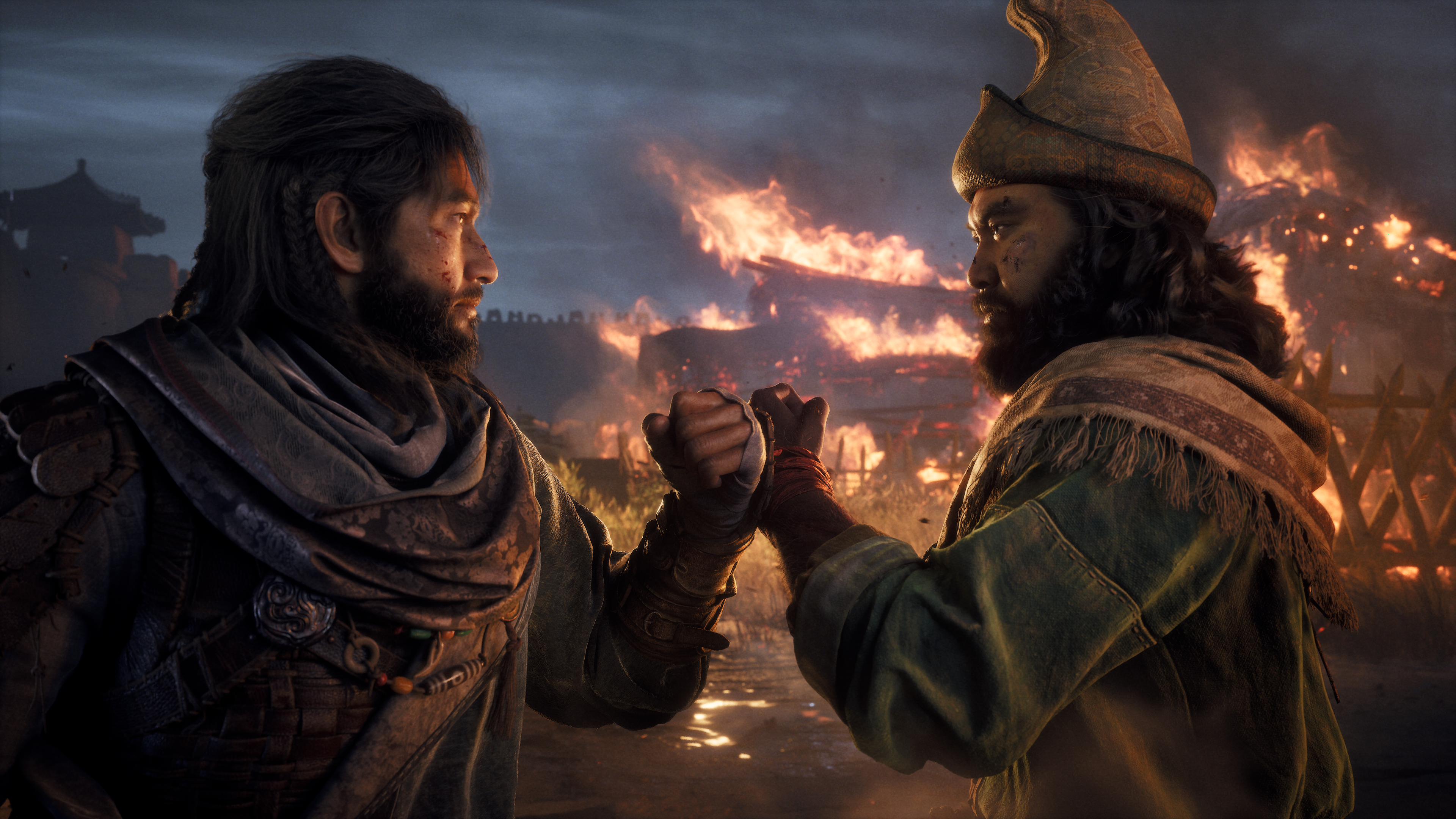
It's a setting with a surfeit of large lads to choose from.
Amazon Studios has the rights to adapt Warhammer 40,000 into “series, film, and more”, a project that Henry Cavill will executive produce and star in. Cavill called it “a Warhammer Cinematic Universe” on Instagram, which makes it sound like we should expect multiple stories. Assuming Cavill isn’t playing every role in all of them—a one-man fringe theater production I would actually watch—he’ll get to portray one character from across the entire setting. So, who should that be?
The obvious thing to do with 40K is tell a story about space marines. The iconic visual of the setting is a strapping lad with a helmet that looks like medieval siege architecture and shoulderpads the size of a family sedan. It’s tough to give a cast made up of space marines interesting personalities, however. They’re indoctrinated, monastic, barely human, and exist only to fight. There’s not a lot of variety there. The first attempt to make a 40K film, the direct-to-DVD Ultramarines: A Warhammer 40,000 Movie from 2010, struggled to differentiate its grizzled cast.
That said, when Marvel picked up the rights to do 40K in comics form they knocked it out of the park. Just like the CGI film, the five-issue miniseries Marneus Calgar was about Ultramarines, who lack the outsized personalities of a chapter like the techno-Viking Space Wolves. Yet it gave Chapter Master Calgar plenty of humanity via flashbacks to his pre-marine days, and provided human characters for scale. Pages of gory ultraviolence were balanced by an adept accompanying Calgar who could react to the horror of the marines’ day-to-day. Something similar, or even a straight-up adaptation with Cavill as Calgar, could definitely work.
Given that Amazon’s 40K will be a lot of people’s introduction to Games Workshop’s gothic-industrial science-fantasy setting, another possibility would be a whole-cloth new character and storyline. Something introductory, intended to take this thing that’s existed for 35 years across in different permutations—sometimes very different permutations—and make it digestible. Which is an almost impossible task. Space, as you’ll be aware, is big, and Warhammer 40,000 takes in multiple alien empires and an entire other dimension of haunted reality, as well as a human Imperium that’s unthinkably vast on its own.
One option would be an episodic series that looks at the setting in individual slices. Have Cavill play a shipmaster or rogue trader with a motley crew and send them across the galaxy to struggle and die in space. Have a look at the Warhammer TV animation Kill Command, which you can watch for free on YouTube, for an example of how grim that could get.
The first time the crew of our imaginary show encounter one of the more fantasy elements of the setting—like the aeldari, who are basically space elves, or the orks, who are literally space orcs, or just straight-up daemons—that might seem jarring to a new audience, but the thing about a serialized show is you can do a horror episode or a comedy one or whatever, then go back to the story you were telling before. Each trip to a different genre is safely quarantined between intro and credits.
Taking Warhammer 40,000 and turning it into a version of Star Trek where everyone’s a hard bastard and the ship looks like an explosion at the Catholic factory doesn’t really light my fire, though. You don’t need the 40K license to churn out yet another spaceship show. If you want something that definitively feels like 40K, the easiest way to do that is to adapt one of the stories that defined it. And hey, if you paid for an entire universe, why not take its best bits?
(Image credit: Black Library)
One of the most popular series of 40K novels is the Eisenhorn saga, which is about an inquisitor who narrates his investigations into Chaos like a noir detective. It’s such an obvious thing to adapt that it’s already being done, with Big Light Productions picking up the rights in 2019.
That production may have quietly died in the intervening years, in which case it could be up for grabs again, or it may be included with the “rights to the universe across series, film, and more” Amazon Studios secured. If so, Cavill would make a fine Eisenhorn. He’s had experience playing a detective in Enola Holmes, but the unsmiling horror-hunter Gregor Eisenhorn is actually closer to another role of Cavill’s: Geralt of Rivia.
Fans have suggested another fitting role for Cavill would be Ciaphas Cain, from a series of books about an Imperial Guard Commissar whose attempts to cover his cowardice see him mistaken for an actual hero and turned into a propaganda weapon. Cain’s square-jawed looks and knack for surviving impossible odds make him seem like a perfect poster boy for the Imperium, even if he’s too soft on his troops and too afraid of dying to really personify the Imperium’s grotesque ideal of harsh self-sacrifice.
(Image credit: Black Library)
I could definitely see a man who looks like Cavill being mistaken for an ideal, and in smaller roles like Humphrey in Stardust he’s shown an ability to switch to comic twittery when necessary. The problem with the Ciaphas Cain stories is that after a promising start, the series begins to treat Cain as a man who just thinks he’s a coward, yet acts like a hero when the chips are down and push comes to shove. And in 40K the chips are always descending and the push is always jostling.
They’re also quite formulaic, both in their plots and how often the same phrases repeat. You could make a decent drinking game out of how often Cain refers to his palms tingling, or smelling his unwashed aide approach before seeing him, or that he wouldn’t have done the thing he’s about to do if he knew how it would all turn out in the end.
Of course, an adaptation doesn’t need his repetitive narration or transformation into an unkillable badass who just happens to be a bit pragmatic. People who make three-hour YouTube videos about how shows ruin books wouldn’t like it, but taking the basic concept of the Ciaphas Cain stories and making something better out of them could be a fun way to introduce the setting, and show that 40K is capable of having a sense of humor rather than just being all grim all the time.
(Image credit: Adrian Smith)
Something that’s not made clear in Games Workshop’s announcement is whether the Amazon deal includes the Horus Heresy, a prequel series set 10,000 years before Warhammer 40,000, which GW tends to treat as a separate thing. If the deal does include the Horus Heresy, that changes things. For starters, it opens up the possibility of the persistent fan-casting of Cavill as the Emperor of Mankind.
I can’t say I’d be in favor of that, though. The Emperor’s psychic abilities mean he looks different to different people, seeming the way they want him to seem, which would be nice to represent by having multiple actors in the role. When we do see the Big E in unguarded moments, he’s consistently described as brown, bronze, golden, or basically a lot of skin colors that aren’t Cavill’s, but do belong to actors who could do with the opportunity to play a role that significant.
And there are plenty of more appropriate roles in the Horus Heresy, which features a cast of ridiculous size. The most popular characters tend to be the primarchs. These experimental demigods served as the genetic source for the space marines, but unlike their typically stoic descendents, the primarchs are larger-than-life exaggerations, mythic characters whose moods are legendary. I’d rather see Cavill as one of them. Maybe the noble, doomed, angelic, Sanguinius, or obsessive perfectionist Fulgrim. Although that would mean another white wig.
(Image credit: Games Workshop)
As with Ciaphas Cain, an adaptation would present an opportunity to fix problems with the books. In the case of the Horus Heresy, their biggest sin is just how many of them there are. There are 54 books in the base series, which was then rebranded and continued as The Siege of Terra, currently seven books deep and with a finale that’s been split over two more books still to come. That’s 62 books, not counting the 17 novels and four anthologies in the Primarchs spin-off series, or the audio dramas, the novellas, and the graphic novel.
When the backstory of this epochal event was first detailed in the 1988 rulebook Realm of Chaos: Slaves to Darkness it took up three pages. Without the art, it would have fit on two.
There’s enough material in the Horus Heresy to make a decent TV show, for sure—just one that’s substantially shorter than the books. (Playing all the audiobooks back to back could take a solid month.) When you read the first three Horus Heresy books, a tight trilogy that’s well worth your time, you can imagine the shape the rest of the series might have taken. Instead, these books pitched as deluxe, niche products became bestsellers and the series was expanded well beyond what it needed. Still, distill it down to the edited highlights and you’d get several seasons of drama out of the fall of Horus, and the war that made the Imperium become a fascist theocracy.
Something the novels have struggled to get across is the tragedy of Horus’s fall. His name’s in the title, we all know what’s going to happen to him, and it’s hard to see him as the beloved statesman and general he is in the early stories, before the preordained betrayal. Now that’s an ideal role for the man whose face is so trustworthy he was cast as Superman. Have Cavill as Horus, the Emperor’s best boy turned greatest enemy, in a big-budget prestige TV series. I’d watch that.



